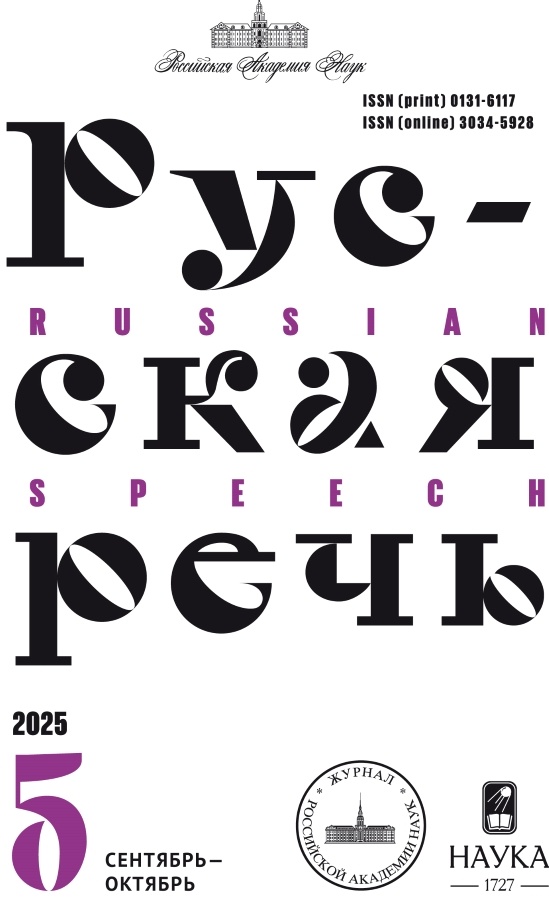On the Word Lād in Russian: Connecting Cooperage, Sound and Art
- Authors: Krugovets V.S.1
-
Affiliations:
- Nizhny Novgorod State Conservatory named after M. I. Glinka
- Issue: No 5 (2025)
- Pages: 55-70
- Section: From the History of the Russian Language
- URL: https://consilium.orscience.ru/0131-6117/article/view/692803
- DOI: https://doi.org/10.31857/S0131611725050055
- ID: 692803
Abstract
One of the central notions of Russian musical theory, the word lād is unique and enigmatic both because of its origin and its entry into musical terminology in the 19th–20th centuries. In Russian music theory, where foreign words prevail, the word lād is remarkable not only for its Slavic origin and for including other musical terms of Slavic origin in its terminological "circle" (ustoï (stable) — neustoï (instable)), but also for the fact that it became one of the key notions and to a certain extent a turning point in the comprehension of music in Russia. The article examines the semantics of this word in diachrony and suggests a "key" or "transitional" meaning, that could clarify the evolution and the transition of this word mostly into music sphere. This meaning is a 'stave of the barrel' or a 'gap between staves of a barrel'. This meaning combines craft, connectedness, sound, harmony, aesthetics and outlines the main trajectories of the evolution of meaning in this word and derived words. Semantic parallels between the Russian word lād and the Greek word ἁρμονία also allow us to emphasize some lines of development of the musical meaning of the word lād.
Keywords
About the authors
V. S. Krugovets
Nizhny Novgorod State Conservatory named after M. I. Glinka
Email: volesna@gmail.com
Nizhny Novgorod
References
- Afonasina A. S. [The birth of harmony out of the spirit of TEKHE]. ΣΧΟΛΗ, 2012, vol. 6, issue 1, pp. 58–75. (In Russ. and in Eng.) Available at: URL: https://cyberleninka.ru/article/n/rozhdenie-garmonii-iz-duha-tekhne/viewer (accessed 19.12.2024).
- Aranovsky M. G. [The theoretical conception of B. L. Yavorsky]. Iskusstvo muzyki: teoriya i istoriya, 2012, no. 6, pp. 44–60. (In Russ.)
- Avanesov R. I. (ch. ed.) Slovar' drevnerusskogo yazyka XI–XIV vv. V 10 t. Tom 4 (izzhivati–molenie) [Dictionary of the Ancient Russian language of the XI–XIV centuries. In 10 vol. Vol. IV (izzhivati–molenie).] Moscow, Russkii Yazyk Publ., 1991. 560 p.
- Bychkov Yu. N. Iz istorii uchenii o lade i garmonii: uchebnoe posobie po kursu "Muzykal'noteoreticheskie sistemy" dlya studentov muzykal'nykh vuzov; Ros. akad. muzyki im. Gnesinykh [From the history of doctrines of harmony and harmony: textbook for the course 'Musical-theoretical systems' for students of music universities]. Moscow, 1993. 72 p.
- CNRTL: Centre National de Ressources Textuelles et Lexicales. Available at: https://www.cnrtl.fr/portail (accessed 19.12.2024).
- Ewel P. On the Russian Concept of Lād, 1830–1945 / Philip Ewell (Hunter College and CUNY Graduate Center). Music Theory Online, 2019, vol. 25 (4). Available at: https://www.mtosmt.org/issues/mto.19.25.4/mto.19.25.4.beavers.html (accessed 25.07.2024).
- Fasmer M. Ehtimologicheskii slovar' russkogo yazyka [Etymological dictionary of the Russian language]. Translated from German and supplemented by O. N. Trubachev. In 4 vols. Vol. 2. Moscow, Progress Publ., 1986. 672 p.
- Filin F. P. (ch. ed.) Slovar' russkikh narodnykh govorov [Dictionary of Russian folk dialects]. Issue 16. Leningrad, Nauka, Leningrad Branch Publ., 1980a. 376 p.
- Filin F. P. (ch. ed.) Slovar' russkogo yazyka XI–XVII vv. [Dictionary of the Russian language of the XI–XVII centuries]. Issue 7. K–KRAGUYAR'. Moscow, Nauka Publ., 1980b. 403 p.; Issue 8. KRADA–LYASHCHINA. Moscow, Nauka Publ., 1981. 351 p.
- Kholopov Yu. N. Garmoniya: teoreticheskii kurs [Harmony: a theory course]. Saint-Petersburg, Moscow, Krasnodar, Lan' Publ., 2003. 544 p.
- Lozovaya I. E. [Concerning the content of the concepts of "glas" and "lād" in the context of the theory of Old Russian monody]. Aktual'nye problemy izucheniya cerkovno-pevcheskogo iskusstva: nauka i praktika [Actual problems of studying church singing art: science and practice]. Moscow, Moscow State Conservatory Publ., 2011, pp. 344–359. (In Russ.)
- Pozhidaeva G. A. Pevcheskie tradicii Drevnej Rusi: ocherki teorii i stilya [Singing traditions of Ancient Rus. Essays on theory and style]. Moscow, Znak Publ., 2007. 880 p.
- Rekomendatsii po ehkspluatatsii rassokhsheisya bochki. Iz Duba [Recommendations for the operation of a dried barrel. Made of Oak]. Available at: https://izduba.ru/bochka-dubovajaekspluatacija (accessed 25.07.2024).
- Sorokin Yu. S. (ch. ed.) Slovar' russkogo yazyka XVIII veka [Dictionary of the Russian language of the XVIII century]. Issue 11. Krepost'– L'nyanoi. St. Petersburg, Nauka Publ., 2000. 256 p.
- Trubachev O. N. (ed.) Ehtimologicheskii slovar' slavyanskikh yazykov [Etymological dictionary of Slavic languages]. Issue 14 (*labati– *lĕteplъjь). Moscow, Nauka Publ., 1987. 268 p.
- Shabalin D. S. Pevcheskie azbuki Drevnei Rusi: teksty [Singing alphabets of Ancient Russia: texts]. Vol. 1. Krasnodar, Sovetskaya Kuban Publ., 2003. 408 p.
- Shmelev A. D. [In search of peace and harmony]. Logicheskii analiz yazyka. Kosmos i khaos [Logical analysis of language: conceptual fields of order and disorder]. Arutyunova N. D. (ed.) Moscow, Indrik Publ., 2003, pp. 54–73. (In Russ.)
- Toporkov A. L. [Pseudo-mythology]. Slavyanskaya mifologiya: ehntsiklopedicheskii slovar' [Slavic Mythology. Encyclopaedic dictionary]. Moscow, International Relations Publ., 2002, pp. 212–212. (In Russ.)
- Zalizniak Anna A. [Semantic derivation in synchrony and diachrony: a project of "The Catalogue of semantic shifts"]. Voprosy yazykoznaniya, 2001, no. 2, pp. 13–25. (In Russ.)
- Zhuravlev A. F., Shanskii N. M. (eds.) Ehtimologicheskii slovar' russkogo yazyka [Etymological dictionary of the Russian language]. Vol. 9. L. Moscow, Publishing House of Moscow State University, 1999. 240 p.










